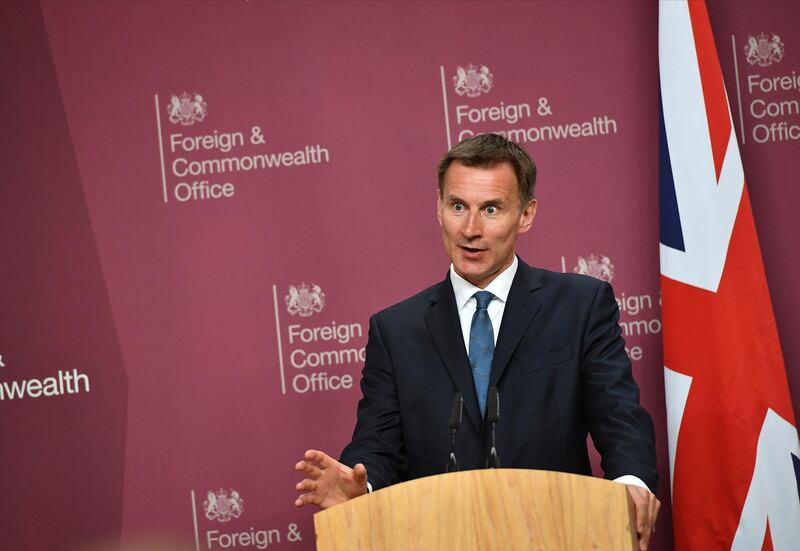The European signatories to the Iran nuclear deal issued a joint statement on Thursday urging the country to reconsider its decision to withdraw from some elements of the agreement.
Representatives of the EU, France, Germany and the United Kingdom urged Iran to continue to implement its commitments under the Joint Comprehensive Plan of Action (JCPOA) and non-proliferation of nuclear weapons treaty, adding that they "reject any ultimatums".
The statement also said they "regret" the United States's decision to reimpose sanctions on the regime.
"We reject any ultimatums and we will assess Iran’s compliance on the basis of Iran’s performance regarding its nuclear-related commitments under the JCPOA and the NPT (Treaty on the Non-Proliferation of Nuclear Weapons)," the statement by the High Representative for the EU and the foreign ministers of the UK, France and Germany said, adding, "we regret the reimposition of sanctions by the United States following their withdrawal from the JCPOA."
So far under the agreement, European countries have tried to develop a system where investors can do business in Iran but avoid breaching US sanctions. However, that has failed in practice, with European companies that sought to invest in Iran doubling back on their initial plans.
Speaking ahead of an EU summit in Romania, French President Emmanuel Macron said that the nuclear deal must be saved and that the accord’s signatories should do all they can to ensure Iran respects it.
Mr Macron said on Thursday that “Iran must remain in this agreement and we must do everything we can to ensure that it stays in.”
"Leaving the 2015 nuclear agreement is a mistake because it is undoing what we have already done. That's why France is remaining and will remain a part of it and I deeply hope that Iran will remain," he added.
The French leader said the deal was “a good agreement”, before adding that it should be completed with other pacts controlling Iran’s missile development.
Arriving at the Sibiu summit, Austrian Chancellor Sebastian Kurz said: "To be honest, we have a different approach than the US has.
"We still think that the deal with the Iranians was a chance to bring Iran out of isolation. But of course we realise and we see that the US has a totally different approach and that is why it will stay a difficult issue."
Tehran said it was partially withdrawing from the commitments it made in 2015 on Wednesday, citing the United States' withdrawal from the treaty and articles allowing their withdrawal if other signatories failed to live up to commitments.
The US Secretary of State Mike Pompeo said Iran is escalating its nefarious activity in the region in a visit to Iraq on Wednesday and the United States has moved an aircraft carrier with B-52 bombers to the region.
The US imposed additional sanctions on Iran on Wednesday, covering commodities like iron and steel.
Lebanon's Hezbollah, which is backed and armed by Iran, criticised the US for its decision on Thursday, saying that they were "unjustified". It a statement, the group said that the sanctions did not respect international laws and Washington "behaves in accordance with the law of the jungle".
The Joint Comprehensive Plan of Action was signed in 2015 in which Iran agreed to curtail their nuclear ambitions and refrain from developing ballistic missiles in return for a lifting of sanctions. But US President Donald Trump withdrew from the treaty last year.
In a speech announcing the partial withdrawal, Iranian President Hassan Rouhani said they will give other signatories 60 days to return to negotiating financial and oil deals. This timeline was seemingly rejected in the European statement.
However, on Thursday, a spokesperson for Iran's Atomic Energy Organisation said that Tehran wanted to bring the agreement "back on track".
Apart from the United States, all other signatories to the deal reaffirmed their commitment to it, urging Iran to abide by their responsibilities.
The Kremlin blamed the United States' decision to withdraw from the deal, saying "now we are seeing those consequences".







